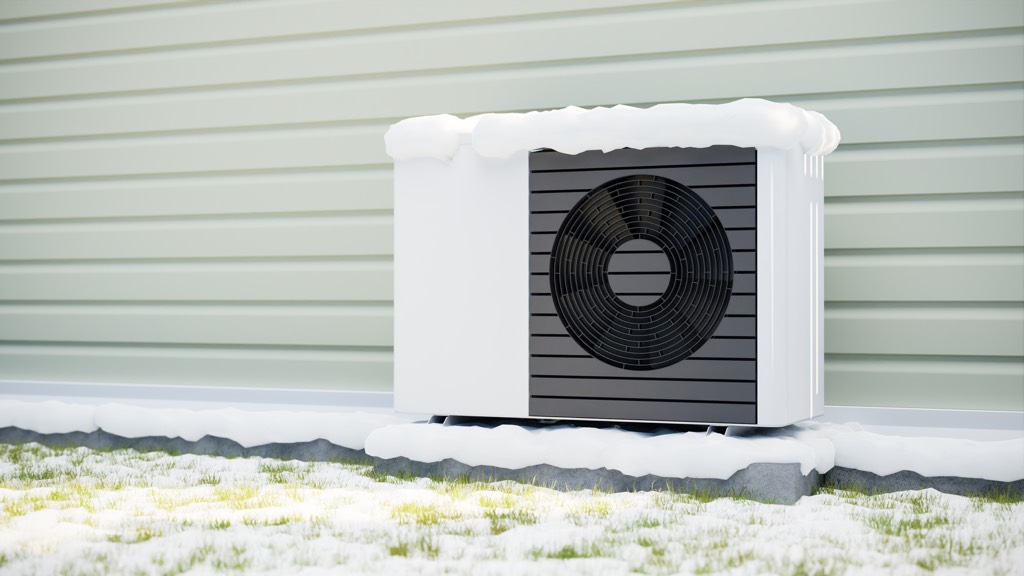A heat pump is able to work in winter because the refrigerant that drives it boils at very low temperatures. Even if it’s cold outside, the temperature is still greater than the boiling point of the refrigerant. The system can absorb heat from the outdoors and transfer it inside.
To understand how does a heat pump work in the winter, let’s first look at how a heat pump functions.
What is a heat pump?
Heat pumps work a bit like an air conditioner in reverse.
An air conditioner takes warm air from inside your home and distributes it outside. Heat pumps take heat from outside your home and distribute it indoors. Air source heat pumps are the most common type of heat pump. They take heat from the outdoor air. Ground source pumps are less common. They take heat from the ground outside your home.
How does a heat pump work?
Like an air conditioner, a heat pump uses a refrigerant to move the heat around. In an air source heat pump, the liquid refrigerant absorbs heat from the outside air. The liquid then boils to become a gas. The gas is then compressed which raises its temperature and it is then circulated inside your home. As the refrigerant is transferred to your home it gives off its heat and cools down. The liquid is recycled outside and the process begins again.
Different types of heat pumps
There are two main types of heat pump system. Air to air systems and air to water systems.
Air to air heat pumps heat your home by distributing warm air. They can work well for open plan houses with lots of space, but they will not heat your hot water. For this you’ll need a separate solution.
Many air to air systems have a reversing valve which changes the direction of the refrigerant flow in the system. This means that the system can deliver cold air on a warm day and warm air in colder temperatures. We call this an HVAC system – which stands for heating, ventilation and air conditioning. They are less common in the UK than in other countries.
Air to water heat pumps are more common in the UK. They work in a similar way. But instead of piping warm air inside your home they use a heat exchanger to heat hot water indoors. This is then used to provide ambient heat (via radiators or an underfloor heating system) as well as hot water for domestic use.
These heat pumps mirror more closely the traditional heating systems in the UK. They can often run on an existing radiator network. But to get them to work efficiently some upgrades to your home may be required.
The refrigerant used in heat pumps boils at around minus 50°C. Given that temperatures in the UK seldom get below minus 10°C there is ample room for the heat pump to absorb heat from the outside air.
Heat pumps in cold climates
In the UK, It is very unlikely that a heat pump will stop working altogether in winter, even at cold temperatures.
That said, most heat pumps do tend to become less efficient at extreme cold (temperatures below minus 10°C). They will need to work a lot harder to extract the heat from outdoors. There are some modern heat pumps that work very effectively at temperatures as low as minus 20°C. These cold climate heat pumps do tend to be quite expensive however.
Energy efficiency
Most heat pumps are at their most efficient at temperatures between 10°C and 20°C. At this temperature they are up to 3 x more efficient than traditional gas boilers. This means that for every unit of energy the heat pump consumes, it outputs 3 times that in heat energy. To put this in context a gas boiler (or gas furnace) will only deliver around 90% of the energy it consumes in heat.
As the outside temperature drops however, a heat pump’s energy consumption will increase. It will become less and less efficient. At lower temperatures the heat pump might be even less efficient than traditional heating systems. At the time of writing (Oct23) the price of gas per KWH is 10.3p in the UK. This compares to the average price for electricity of 34p/KWH.
So while a heat pump might continue working in cold weather, it might not be the more efficient way to heat your home. When the heat pump and the gas boiler match each other in efficiency, the heat pump will be more expensive to run due to the higher energy costs for electricity.
This might not be true in the future however, as we expect electricity prices to drop. But it is something to consider if you are looking to reduce your energy bills.
Keeping your heat pump working in the winter months
There is no need to panic if you see ice on the outdoor unit of your heat pump. This is not normally a cause for concern. However if too much ice forms on the fins of the evaporator it can block the outside unit from working.
At some point in the heating cycle, the heat pump will switch onto the defrost cycle. During this process, the heat pump unit will deliver heat to the evaporator and melt any ice crystals. This is a normal process. While it might produce a lot of steam, it is nothing to worry about.
Maintaining a comfortable temperature
Typically an air to water heat pumps is optimised to run at around 40°C to 45°C inside your home. This is the optimum temperature for a heat pump’s effectiveness. It is much lower than the a typical natural gas furnace (gas boiler) which runs at around 65°C.
The problem with this is that the water inside the radiator will be much cooler than with a gas boiler system – around 25% in fact. To ensure you maintain a comfortable indoor environment, the radiators will need to be more powerful. Many home owners will have to upgrade their radiator systems when they install an air to water heat pump.
If you decide not to upgrade your radiators, you might find this is fine during the summer months. During a cold day however, when you need a enough heat, you may find that your radiators just aren’t getting hot enough to maintain a comfortable indoor temperature.
Some modern heat pumps are able to supply water at the same level at a gas boiler. This means you won’t have to upgrade your radiator system. However they do tend cost a lot of money – certainly more than regular models.
How does a heat pump work in winter? – in summary
Many homeowners are looking for a cost-effective way to heat their homes. They want to use less energy and at the same time reduce their dependance on fossil fuels. Heat pumps can be a good idea, even in colder climates. The important thing is to specify the right type of system for your home.
We’ve tried to answer the most common heat pump questions elsewhere on this site. Including how much an air source heat pump costs and the funding available for heat pump installation. There is also more information on different types of heat pump including air-source heat pumps and ground source heat pumps.

